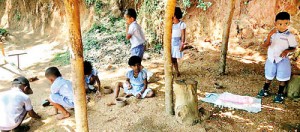If we can help some needy children
Mahiyangana is the other side of the world for those who seldom travel outside Colombo. But the dry zone Uva Province district attracts a steady flow of sightseers who come to visit the Wasgamuwa nature reserve and the many religious sites that grace the area.
It was during a visit to the Wasgamuwa Nature Reserve by a group of Sri Lankan expats on holiday from Australia that the late Asoka Perera went exploring on his own and discovered a village of wattle-and-daub huts and a scattering of brick houses. He stopped to speak to the locals. They were having a hard time surviving, with elephants from the reserve invading their fields and gardens. The children hung onto their parents and looked up at the stranger. The stranger made enquiries and was told there were no school facilities for the very young. No “Montessori” or pre-school. When he got back into his car, his mind was made up. If the state had not set up schools for the children in the area, he would, with the help of friends and relatives.
That was the beginning of a fervently organized initiative to collect money to build Wasgamuwa’s first pre-school. Asoka Perera, an “old boy” of S. Thomas’ College, Mount Lavinia, and his support team in Sri Lanka and Australia raised sufficient funds to build a basic pre-school for the Wasgamuwa village community, whom he described to well-wishers as “poorest of poor.” The school was an outright gift to the village.
Asoka Perera and his team also showed the villagers ways they could help themselves. Sewing machines were purchased for the women, cows were bought and the villagers taught how to make yoghurt. They were also shown how to make soap and candles, dry freshwater fish and cultivate mushrooms to sell in the market.

Playtime: The children amuse themselves after school
Asoka Perera electrified a few homes and distributed spill-proof oil lamps and solar lamps, as well as powerful flashlights to keep the elephants away from the huts. A team of four doctors from Colombo, armed with medical supplies, treated 85 patients during a one-day medical project.
In months, a school building came up on land held in common by the villagers. A Montessori-trained teacher was found, and 20 pupils – the oldest five years, the youngest three – turned up for classes. That first day at their first pre-school was a big occasion for all.
The school has grown in stages. Next to the single-room school is a playground with swings, a slide, and structures for climbing and crawling and having a fun time outdoors.
The school is still growing. The teacher needs further training in pre-school education. Electric fans are a desperate need in the large classroom, which has roof-high walls on three sides and a short wall facing the play area. Electricity was installed a few months ago. Books and art and craft materials are needed. For now, the children come empty-handed to class. The school is short of essential teaching materials, such as colouring pencils and crayons and drawing books, and books to teach Numbers and the Sinhala and English Alphabets. The children copy on sheets of A4 paper what the teacher draws on the blackboard.
Filling the centre of the classroom are four little desks painted red, yellow, blue and green, each desk seating five children, and 20 little people’s chairs painted to match, along with the teacher’s desk and chair. In a corner is a water filter. Water comes from a well in the garden. Hung up on one wall is the children’s class work, held in plastic folders arranged in a row.
Classes are over and it is playtime until the parents come to pick up the children. It is hot in the garden. We sit in an enclosure with a cadjan roof and watch as the children amuse themselves. The girls are playing with two tall-long plastic dolls; one is placed on the sand and covered with a handkerchief, as it is noon, siesta time. The boys are making “kiribath” out of pebbles and sand, using blue plastic containers and coconut shells. They bring us a serving of the “milk rice”, and shyly tell us their names. Parents start arriving, young mothers under umbrellas, fathers on bicycles. Before school closes for the day, we are all invited back indoors for a treat of biscuits and orange barley served by parents and the teacher.
It is time to say bye. There is wide-eyed hope and expectation in the smiling faces at the gate. The support team of sponsors that has just paid them a visit said they will be back, soon, with more “goodies” for the school and the pupils.
The organisers say the charity concert could raise Rs. 200,000 if all 200 tickets are sold. The money will be spent on the pre-school’s immediate needs, including a training upgrade for the teacher. The balance will go towards helping two other pre-schools that have recently come up in neighbouring villages. The success of the first school has inspired pre-school interest in the vicinity.
The charity concert, “If I Can Help Somebody”, will be held at the Bible Society Auditorium, Galle Road, Kollupitiya on Saturday, May 23, starting at 7 p.m. The choral-instrumental programme will include popular songs and classical music, with works by J. S. Bach, Handel, Corelli, Schubert, Chopin and Andrew Lloyd-Webber. Performers are members of the Merry-An Singers and others. Among the soloists are Manique Fernando, Sanjeev Niles, Shirley Willathgamuwa, and Srian, Johaan and Mark Goonewardene. (For more information, call 011-2588183 or 0770777638.)


